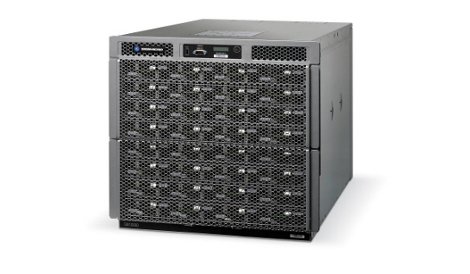AMD celebrated a big and high-profile customer win Monday, announcing that Verizon had chosen its SeaMicro SM15000 servers to power the new public cloud services it announced last week.
Verizon has added Infrastructure-as-a-Service and cloud storage to its cloud portfolio. These allow customers to quickly provision virtual servers and object storage capacity through an online portal and use them on a pay-as-you-go basis.
SM15000 servers are 10U boxes with 512 processor cores and about five petabytes of storage. The fabric that interconnects these resources is called the Freedom Fabric, a technology developed by SeaMicro, the server manufacturer AMD bought in February 2012.
The servers support AMD's own Opteron processors, as well as Xeon and Atom lines by Intel Corp. The Verizon deployment includes both Opteron and Xeon chips, a company spokeswoman wrote in an email.
The hardware and software underpinning Verizon's new cloud services was developed jointly by Verizon and AMD. The hardware has programmable data and control plane for both network and storage traffic, which according to AMD increases Verizon's ability to offer performance guarantees and SLAs (service level agreements) to customers.
Users can define VM and network performance of their cloud compute resources and configure storage. Multiple VMs can share a single storage resource.
Verizon has a lot of powerful competition in the raw IaaS and cloud storage market. The biggest and oldest player here is Amazon Web Services, but a multitude of other companies – many of them also big and famous – have joined the space recently.
Among the high-profile newcomers are Google, VMware, HP and, most recently, Oracle, which announced its IaaS and cloud storage ambitions at last month's OpenWorld conference in San Francisco.
Verizon has already secured a few clients for the new IaaS services. They include The Weather Company, a weather forecasting company, and Engine Yard, a Platform-as-a-Service (PaaS) provider.
Bryson Koehler, The Weather Company's CIO, said the firm was linking a large part of its technical infrastructure to Verizon's public cloud. The firm's business requires powerful analytics capabilities to derive forecasts from dynamic weather datasets, but it was unclear whether any of that big number-crunching is going to take place in the public cloud.
Rob Walters, the CTO of Engine Yard, said the cloud will give the company ease of deployment and flexibility.
“We’ve had a long and successful relationship with Verizon,” he said. “We’ve deployed some of our most demanding enterprise-grade applications on Verizon cloud infrastructure.”

